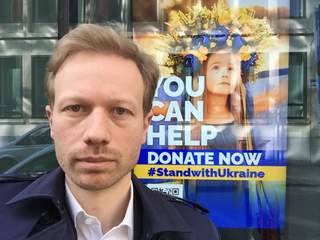
Joscha Ritz in front of the BDI/ BDA Representation in Brussels © BDI
Brussels under the impression of the war in Ukraine
As the father of three German-Estonian children, I am experiencing the Russian attack on the European peace order very intensively. Talking to my family in Estonia, I sense how much the people in Europe's post-Soviet states feel threatened by Russia - and not just since today - and how strong the will is to defend freedom and the homeland. These days, I feel the same as many people in Brussels who work in the environment of the EU institutions: We all have colleagues, friends who are very worried about their homeland and we are moving even closer together.
The Ukraine war is shaping the political scene in Brussels. Hardly a day goes by without the EU launching more and more new humanitarian aid measures for Ukraine and sanctions packages against Russia. The legal texts, which are as far-reaching as they are highly complex, pose great challenges even to long-time experts on EU sanctions policy.
The Europeans' quick and united reaction to the Russian war of aggression also surprised and made me feel relieved. Since then, the otherwise vocal critics of a clear EU edge against Putin's Ukraine policy have gone into hiding: Whereas in December 69 MEPs had still voted against a resolution on the situation on the Russian-Ukrainian border, at the beginning of March only 13 far-right and far-left MEPs could be found voting against an EP resolution condemning Russia's war of aggression - 637 voted in favour.
Beyond the immediate crisis reaction, a discussion on the consequences of the Ukraine war for the EU's political agenda has long begun in Brussels: How can the EU cushion the impact of very high energy prices and become independent of Russian energy supplies as quickly as possible? What measures are needed to strengthen Europe's defence capability? How can the EU reduce its dependence on critical raw materials? Which international partnerships should the EU strengthen now? On all these questions and many more, politicians and stakeholders are engaging and making good arguments why their concerns are more important than ever in the current situation.
Industry in Europe has clearly backed the EU sanctions policy against Russia. In the many crisis talks in our European umbrella organisation BusinessEurope, I sense a high willingness of national industry representatives to bring Europe's great economic weight to bear in defence of peace, freedom and democracy. These days, European solidarity is becoming very concrete: Our European partner associations - not only in Central and Eastern Europe - have launched concrete initiatives to support humanitarian aid or the integration of refugees into the labour market. And there is great understanding for the mutual concerns and needs - also for the German worries in view of the possible social and economic consequences of an immediate stop of Russian energy imports.



